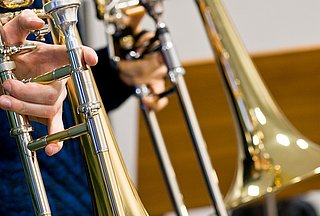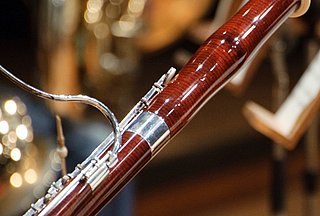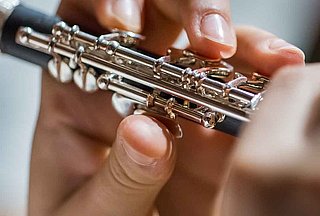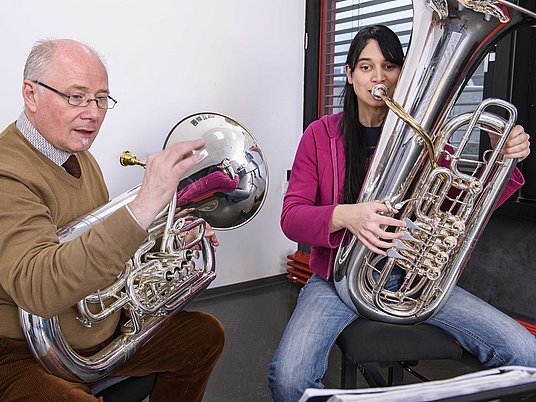Bachelor of Music -
Brass Instruments
About the programme
The bachelor's degree programme in brass at the Cologne University of Music and Dance can be studied with the main subjects horn, trombone, trumpet or tuba. In addition to individual tuition, chamber music is traditionally very important for brass students. The artistically well-matched team of teachers favours this ensemble work. In the newly founded brass academy, students make music together with their teachers. The work phases of the university orchestra, projects of the departments of old and new music, choir and opera performances expand the possibilities of experience for our students. Master classes, workshops and performances within the framework of our diverse cooperations complement the range of studies. Detailed information about the respective major subject can be obtained by contacting the respective major subject teacher directly.
If you have any questions about the degree programme, please contact: Prof. Ulrich Flad
Basic information
| Degree | Bachelor of Music |
|---|---|
| Period of study | 8 Semester |
| Course begin | Wintersemester |
| ECTS points | 240 Credits |
| Major subjects | Horn, Posaune, Trompete, Tuba |
| Continuing study options | Master of Music Wind Instruments, Master of Music Chamber Music, Master of Music Orchestral Playing |
Application and aptitude test
Applications are submitted online via the muvac platform. All information on the procedure can be found on our application page.
Admission requirements
- General higher education entrance qualification or a comparable higher education entrance qualification
- Proof of a language certificate Test DaF 3 for non-German-speaking applicants
- Successfully passed aptitude test
Aptitude test
The aptitude test consists of the following three parts
- Artistic-practical examination in the main subject (duration approx. 15 minutes)
- Practical artistic examination in the minor subject piano (duration approx. 10 minutes)
- Music theory (elementary composition/ear training) (written examinations, duration together approx. 90 minutes)
Detailed information can be found in the aptitude test regulations, in particular in the appendix for content requirements and conduct of the examination.
Course of studies and examination regulations
The programme is divided into a basic study period (1st and 2nd year) with a high proportion of compulsory modules and a differentiated main study period (3rd and 4th year). The structural framework is formed by 7 main modules and the 8th profile-forming module:
Core module (main subject teaching)
- artistic-practical context (orchestra, chamber music, subsidiary subject)
- education (ear training, music theory, musicology)
- teaching (didactics)
- professionalisation (musicianship, etc.)
- Bachelor thesis / interdisciplinary project
- Supplement
- Profile formation, you can choose between the profile Orchestra and the profile Instrumental Pedagogy.
It takes four years to complete your Bachelor's degree. Participation in all required courses is certified in the form of credit points, 60 per year, 240 in total. Graded examinations in the core module (major subject) take place after the second and fourth year of study. The degree includes a Bachelor's thesis, which can be presented in the form of a one-hour concert, for example, taking into account your own profile. Public concerts and weekly auditions of the training classes serve - in addition to participation in the ensembles of the university - to test real performance situations.
Supervision in the core module includes weekly lessons and auditions, correpetition, secondary instrument lessons, reed/reed building (clarinet, saxophone, oboe, bassoon) chamber music and orchestral literature playing (ensemble exercises). In addition, workshops are offered by renowned external musicians, for example for new playing techniques of contemporary music, performance practice of early music, mental training, ensemble-suitable listening, etc..
Teachers
Aufführungspraxis für Bläser
Barocktrompete
Fachdidaktik 2 tiefe Blechblasinstrumente, Posaune
Horn
Horn, Naturhorn
Horn, Wagnertuba
Korrepetition Bläser
Korrepetition Horn
Korrepetition Klarinette und Trompete
Korrepetition Posaune, Trompete
Korrepetition Trompete und Posaune
Posaune
Posaune, Bass-Posaune
Trompete
Bläserkammermusik
Current events
Kammermusiksaal Köln

Kammermusiksaal Köln

Kammermusiksaal Köln

Kammermusiksaal Köln


Contact

Dean Department 3
|
paul.vanzelm@hfmt-koeln.de |
|
| Address |
Hochschule für Musik und Tanz Köln Unter Krahnenbäumen 87 50668 Köln |



